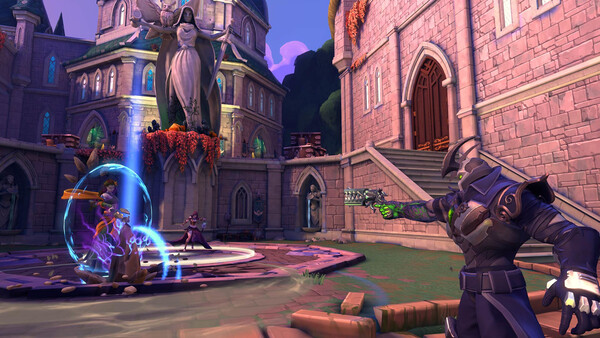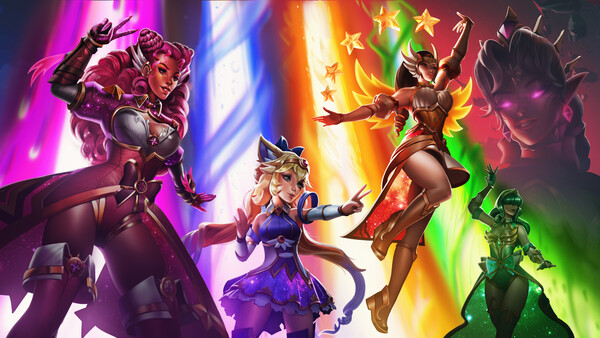Paladins, a popular hero shooter developed by Hi-Rez Studios, has maintained a vibrant community since its launch. The game's unique combination of fast-paced action, diverse characters, and strategic team play has made it a fan favorite. However, one recurring issue that has stirred debate among the player base is its
matchmaking system. Players have consistently raised concerns regarding
inconsistent matches, where teams seem either grossly overpowered or underpowered. In this article, we’ll dive deep into the challenges and intricacies of Paladins’ matchmaking, exploring how it impacts player experience, competitive integrity, and the potential fixes that could improve fairness.
Understanding Paladins' Matchmaking System
The matchmaking system in
Paladins is designed to pair players of similar skill levels into balanced teams. The system considers
Elo ratings or
MMR (Matchmaking Rating), which attempts to assign a numeric value to a player's skill. Ideally, teams should be balanced, with both sides having similar average MMR, ensuring close and competitive matches.
Elo and MMR: The Backbone of Matchmaking
The concept of
Elo or
MMR comes from chess and other competitive games. In Paladins, this rating system is dynamic, adjusting based on player performance. When a player wins, their MMR increases, and when they lose, it decreases. However, while this may work on paper, there are several underlying issues that compromise the matchmaking process in Paladins.
The Problem of Uneven Matchups
One of the most common complaints from players is the occurrence of
uneven matchups, where one team is composed of high-skill players, while the other team has newer or less experienced players. This leads to
one-sided matches, which are frustrating for both sides—victors feel the match was too easy, while the losing team is left demoralized.
Team Balance and Its Impact on Enjoyment
When matchmaking places players into uneven teams, it diminishes the enjoyment of the game. For many, playing Paladins is about experiencing competitive, nail-biting matches where every decision counts. But when the outcome is determined within the first few minutes due to skill disparity, players feel robbed of that experience.
How Randomization Can Lead to Frustration
The
randomization factor in team selection is another point of concern. Paladins often mixes solo players with premade teams, which can further skew the balance. A premade team of friends will have better coordination and communication than random solo players, leading to a significant advantage that the matchmaking system doesn't always account for.
The Influence of Premade Teams in Matchmaking
Premade teams, or groups of friends queuing together, pose a particular challenge to the matchmaking system. While these players should be at similar MMR levels, their
cohesion and communication give them an inherent advantage over a team of solo players.
How Communication Affects Match Outcomes
In Paladins, communication and coordination are critical to winning games, especially in modes like
Siege or
Ranked. A team that communicates effectively can plan strategic plays, set up ambushes, and coordinate ultimates. Solo players without voice chat or team coordination struggle to match this level of synergy, creating unbalanced matches even if the MMRs are technically equal.
Suggestions for Fixing Premade vs. Solo Queues
One solution to this issue is to create
separate matchmaking pools for solo players and premade teams. Other competitive games such as Overwatch have implemented similar systems, where solo players are only matched with other solo players. This ensures that the skill disparity from coordination isn't a factor in these matches.
Matchmaking in Ranked Mode: The Struggles of Competitive Integrity
The problems with matchmaking become even more apparent in Paladins'
Ranked Mode, where competitive integrity is paramount. Players expect that the ranked environment will foster fair, balanced, and challenging matches. However, the current matchmaking system in Ranked often falls short of these expectations.
The Issue of Unbalanced Ranks in Ranked Matches
A common issue is the presence of unbalanced ranks in matches. Players in
Bronze or Silver may find themselves up against
Platinum or Diamond players, leading to unfair matches where lower-ranked players stand no chance of winning. This issue not only affects the outcome of the game but also creates a frustrating experience for players trying to climb the ranks.
The Role of Smurfing in Ranked Matches
The presence of
smurfs, or highly skilled players creating new accounts to play against lower-ranked players, exacerbates this problem. Smurfing can severely skew matches, as these players dominate lower-ranked games, making it impossible for genuine lower-ranked players to progress.
The Role of Champion Selection in Matchmaking Imbalance
Another significant factor that affects the balance of matches is
champion selection. Paladins has a diverse roster of champions, each with unique abilities and roles, ranging from damage dealers to support characters. However, when the matchmaking system fails to account for team composition, it can lead to further imbalance.
The Importance of Balanced Team Composition
A well-balanced team in Paladins includes a
tank, a
damage dealer, a
support, and a
flank. If matchmaking doesn't ensure that both teams have a balanced composition, one team may dominate simply due to having a better lineup. For instance, a team with no support will struggle to stay alive against a team with effective healing.
The Impact of Player Behavior on Matchmaking
Another key issue affecting matchmaking is
player behavior. Toxicity, AFKs (away from keyboard), and intentional feeding can ruin even the most balanced matches. The current reporting and punishment system in Paladins does not adequately address these behaviors, leaving many matches unfairly skewed.
Toxicity and Its Impact on the Competitive Experience
Toxic behavior, such as insulting teammates or refusing to cooperate, significantly impacts team morale and performance. Even if matchmaking is fair, a toxic player can cause a team to underperform, leading to a frustrating experience for everyone involved.
The Need for Stronger Punishment Systems
Implementing
stronger punishment systems that quickly identify and penalize toxic players could help alleviate this problem. Games like League of Legends have implemented automated systems that review player reports and issue punishments quickly, reducing the negative impact on the community.
The Issue of Queue Times vs. Match Quality
Paladins players also face the challenge of
long queue times, especially in Ranked or at higher MMRs. To reduce queue times, the matchmaking system sometimes relaxes its parameters, leading to less balanced matches.
The Trade-Off Between Queue Times and Match Balance
There’s a delicate balance between reducing
queue times and ensuring match quality. While players don't want to wait for long periods, they also don't want to be placed in unbalanced games. Striking the right balance is key to maintaining player satisfaction.
Possible Solutions for Improving Paladins' Matchmaking System
There are several potential solutions to the matchmaking issues in Paladins, ranging from
MMR adjustments to better team composition algorithms. By improving these areas, Hi-Rez Studios could enhance the fairness and competitive integrity of the game.
Adjusting the MMR System for Better Balance
One solution could be to adjust the MMR system so that it accounts for more factors than just wins and losses. For instance, taking into account individual performance metrics, such as
kills, healing, and objective time, could provide a more accurate representation of a player's skill.

Conclusion
The matchmaking system in
Paladins remains a critical issue that affects player experience, especially in competitive modes. While the game itself offers thrilling gameplay and a diverse roster of champions, the frustration caused by unbalanced matches, smurfs, and toxic behavior tarnishes the experience for many players. By addressing these issues, Hi-Rez Studios could significantly improve the fairness and enjoyment of Paladins' competitive environment.




 Rematch
Rematch is a high-stakes competitive action game where every loss is just the beginning of your comeback story. Step into dynamic arenas filled with rival players, shifting environments, and unpredictable mechanics that test your reflexes, strategy, and resilience.
In Rematch, no match is ever truly over. Analyze your defeats, adapt your playstyle, and dive back in stronger. The game thrives on intense 1v1 duels, team rivalries, and an evolving narrative shaped by your performance. Whether you're avenging a narrow loss or proving your dominance in a long-standing feud, Rematch turns every second chance into a shot at greatness.
Key Features:
Fast-paced, skill-based combat with deep strategic layers
Unique rematch mechanics that track rivalries and history
Ranked multiplayer and tournament modes
Adaptive AI and replay systems for training and growth
Rich visuals and soundtrack that heighten every encounter
Are you ready to rewrite your legacy? Step into the arena. It’s time for a Rematch.
Read full review
Rematch
Rematch is a high-stakes competitive action game where every loss is just the beginning of your comeback story. Step into dynamic arenas filled with rival players, shifting environments, and unpredictable mechanics that test your reflexes, strategy, and resilience.
In Rematch, no match is ever truly over. Analyze your defeats, adapt your playstyle, and dive back in stronger. The game thrives on intense 1v1 duels, team rivalries, and an evolving narrative shaped by your performance. Whether you're avenging a narrow loss or proving your dominance in a long-standing feud, Rematch turns every second chance into a shot at greatness.
Key Features:
Fast-paced, skill-based combat with deep strategic layers
Unique rematch mechanics that track rivalries and history
Ranked multiplayer and tournament modes
Adaptive AI and replay systems for training and growth
Rich visuals and soundtrack that heighten every encounter
Are you ready to rewrite your legacy? Step into the arena. It’s time for a Rematch.
Read full review
 S.T.A.L.K.E.R. 2: Heart of Chornobyl
Survive brutal firefights, mutants, and radiation while making moral choices in S.T.A.L.K.E.R. 2: Heart of Chornobyl. Explore a deadly open-world and uncover its darkest secrets. Play now on PC & Xbox.
Read full review
S.T.A.L.K.E.R. 2: Heart of Chornobyl
Survive brutal firefights, mutants, and radiation while making moral choices in S.T.A.L.K.E.R. 2: Heart of Chornobyl. Explore a deadly open-world and uncover its darkest secrets. Play now on PC & Xbox.
Read full review
 Roblox : Grow a garden
Grow a Garden on Roblox is a fun farming sim where players plant, harvest, upgrade, and customize their gardens.
Read full review
Roblox : Grow a garden
Grow a Garden on Roblox is a fun farming sim where players plant, harvest, upgrade, and customize their gardens.
Read full review
 Marvel’s Spider-Man 2
Marvel’s Spider-Man 2 is a next-gen superhero epic with dual heroes, cinematic storytelling, and bold upgrades.
Read full review
Marvel’s Spider-Man 2
Marvel’s Spider-Man 2 is a next-gen superhero epic with dual heroes, cinematic storytelling, and bold upgrades.
Read full review
 Bloons TD 6
Bloons TD 6 is a top-tier tower defense game with deep strategy, 3D visuals, heroes, and endless content.
Read full review
Bloons TD 6
Bloons TD 6 is a top-tier tower defense game with deep strategy, 3D visuals, heroes, and endless content.
Read full review
 Five Nights at Freddy’s
Five Nights at Freddy's is a chilling horror series with deep lore, iconic characters, VR entries, and a huge fanbase.
Read full review
Five Nights at Freddy’s
Five Nights at Freddy's is a chilling horror series with deep lore, iconic characters, VR entries, and a huge fanbase.
Read full review